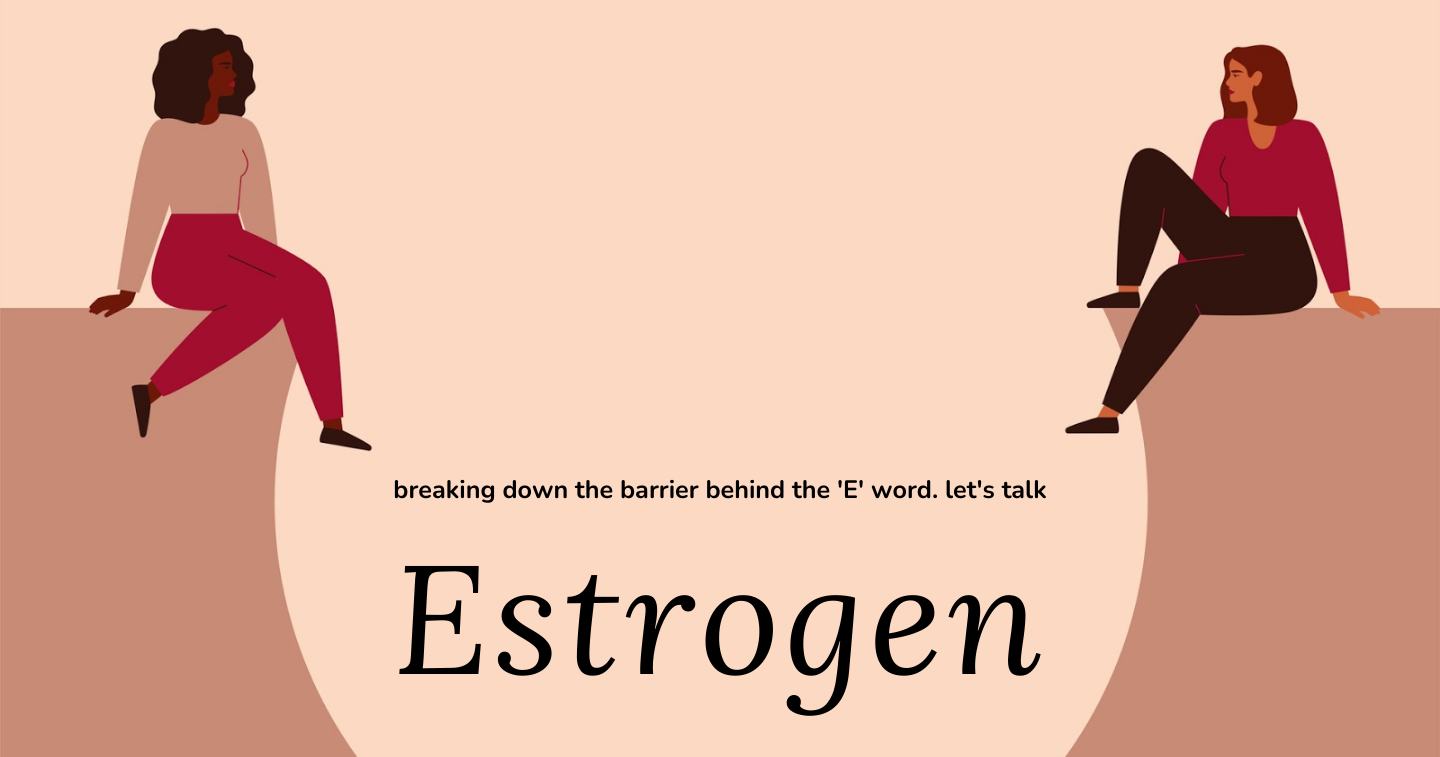Estrogen: Breaking down the fear around the ‘E’ word.
The following is a resource document put together by NutriChem Clinicians for the following Facebook Live: Estrogen, Breaking Down the Fear around the ‘E’ Word. This video was published on our Facebook Page on June 3rd 2021. *This blog is not intended to represent medical advice. Please contact a qualified health practitioner if you want to use any natural health products for specific health conditions.
Those 3 words: Hormone Replacement Therapy (HRT) can cause a huge amount of anxiety in some patients and even healthcare providers. Many people when they hear the word estrogen immediately think of Cancer and risks. What they don’t think about is the why behind those thoughts.
Join Dr. Emma and Grace as they discuss how hormonal changes can impact your life. We will also present the vastly fluctuating levels of estrogen in a woman’s life and where hormone replacement fits into this picture. And why Estrogen should be a woman’s friend and not enemy.
You can watch the video here.
5 Key Areas that are impacted by changing hormones
- Sleep — when there are big hormonal changes often one of the first areas to go is sleep quality. Waking up frequently in the night and struggling to fall back asleep. This is a key change that impacts all of the other areas listed below.
- Mood — Women often site that they ‘don’t feel like themselves’. They can find themselves more irritable and anxious than they ever used to be. This can put strain on relationships and family dynamics especially when someone doesn’t understand why they are feeling different. Disrupted sleep can have significant impacts on both mood and eating habits.
- Joint pains – Achiness, stiffness, soreness, basically feeling like you have aged overnight. We have hormone receptors all over our bodies – muscles, bones, and joints are impacted when hormone levels start to decline.
- Weight changes — Hormones don’t just make us gain weight but big shifts that disrupt sleep and mood can throw our diet off and make us more prone to weight gain. Estrogen is also a significant factor for proper weight distribution in women, so when those levels start to go haywire we often see women complain about weight gain in the middle section when that wants previous a problem area.
- Libido — Not just libido but actual aspects of pleasure and intimacy. Many women experience significant vaginal dryness and discomfort during intercourse as they transition through hormonal changes.
Non-Hormonal Tips for supporting hormonal changes:
- Recognize. There is not something ‘wrong’ with you – this is your biochemistry wreaking havoc. If you don’t feel like yourself and things are drastically changing you are likely right. Understanding that you aren’t going ‘crazy’ and there is an underlying reason you feel this way can make women feel much more empowered on this hormonal journey.
- Removing sleep and mood disruptors. While your body is going through such a big change it is important to try and stabilize other areas of your body. Removing or significantly decreasing the following can have a substantial impact on sleep and move.
a. Alcohol- Alcohol is one of the worst triggers for night sweats, hot flashes, and disrupted sleep.
b. Refined Sugar Disrupting blood sugars in the evening can not only impact sleep quality but also can impact mood and focus the next day. - Exercise Brining in some form of exercise can be incredibly important for mood, anxiety, and sleep support.
- Gentle hormone support. Magnesium, Vitamin D, and B6 can be incredibly useful for helping to stabilize mood and sleep during times of hormonal fluctuations.
About the Speakers
Dr. Emma Pollon-Macleod
B.Sc., N.D.
Naturopathic Doctor
Dr. Emma, ND is a passionate advocate for true integrative healthcare. With a special focus on complex allergy conditions she understands that people are looking to feel comfortable in their body again and are mostly being presented with minimal options beyond antihistamines from conventional healthcare. She recognizes that people are frustrated with being told that they will experience their hives/congestion/rashes/asthma/ MCAS/ reactions forever and that there is nothing else to be done beyond antihistamines.
Dr. Emma focuses on finding the root cause of allergies because everyone deserves a chance at good health. Her philosophy is that prescription medications can be an essential part of managing symptoms but are not the only answer to complex conditions. If we address the root cause of your allergic condition and support immune function, digestive health, and hormonal health we can see incredible shifts in the allergic response that allows you to enjoy your life. And guess what – you will notice other areas in your body, such as energy headaches , sleep, brain fog, improve as well! If we don’t address underlying allergic triggers and don’t treat the root cause we often see increased need for higher doses of medications,, increasing severity of reactions, and poor quality of life in general.
Dr. Emma has a personal history of complex allergic reactions which lead her to focus on this in her clinical practice. She has seen hundreds of patients with symptoms ranging from asthma, chronic urticaria, histamine intolerance, chronic sinusitis/congestion, environmental allergies, food intolerances, MCAS, skin rashes/eczema, skin flushing, rosacea. She has guided these patients to significant reductions in intensity and severity of their reaction and in some cases resolution of their symptoms.
Dr. Emma’s education includes a degree in Biochemistry from the University of Guelph and a Doctorate of Naturopathic Medicine from the Canadian College of Naturopathic Medicine. She has completed additional educational requirements in order to prescribe Bio-Identical hormones and Natural Desiccated Thyroid.
You can book online with Dr. Emma Pollon-MacLeod here!
Grace Meehan
B.Sc. Phm.
Clinical Pharmacist & Certified NAMS Practitioner
After practicing as a pharmacist for twenty years, Grace became interested in women’s health, especially the transition through menopause and beyond. She joined the North American Menopause Society (NAMS) in 2010 and became a NAMS Certified Menopause Practitioner.
Grace understands that everyone experiences menopause differently, and that there is no “one-size fits all” approach. Alongside her patients, she explores how they can achieve their individual goals for optimal health.
You can book online with Grace here!



